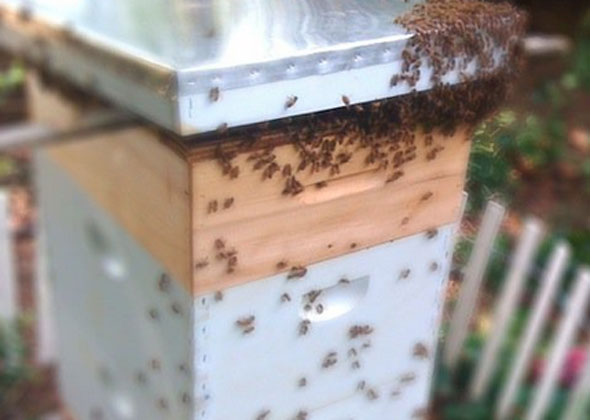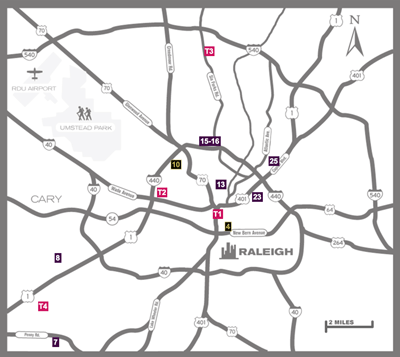Thank a bee on the Tour’s Hive Hike
Sometimes events take on a life of their own and end up a little different than they were in the beginning. And so it is with the Tour D’Coop. No worries, though, because the Tour has become even bigger and better than the original founders’ could have ever imagined (they who were shocked when hundreds of visitors showed up that first year, instead of the “maybe 50” they planned for!). What started out years ago to be a day all about chickens has evolved to be a fantastically fun day all about chickens and gardens and sustainability and community and….bees!
 A lot of people who are interested in urban chickens care about local food sources, too — especially uber-local, as in, from-their-own-backyard. Which means they have gardens. Gardens which need fertilizer (aka chicken poop), and pollinators (bees) and, of course, you see where this is going. So we’ve always had bees on the Tour — we’ve just never featured bees on the Tour. Finally, the time has come to give them the respect they’re due — this year we’ve created a “Hive Hike” to showcase homes with active bee hives for Tour visitors.
A lot of people who are interested in urban chickens care about local food sources, too — especially uber-local, as in, from-their-own-backyard. Which means they have gardens. Gardens which need fertilizer (aka chicken poop), and pollinators (bees) and, of course, you see where this is going. So we’ve always had bees on the Tour — we’ve just never featured bees on the Tour. Finally, the time has come to give them the respect they’re due — this year we’ve created a “Hive Hike” to showcase homes with active bee hives for Tour visitors.
On the Hive Hike — which is not really a “hike” at all, unless you choose to be afoot– visitors can see first-hand how chickens and bees are literally “kissing cousins” in urban, backyard ecosystems–important players on Mother Nature’s stage, even in the city. Given that they are so complementary in town, I hesitate to think what bees and chickens are up to down on the farm (something dirtier than kissing, no doubt, as in full-of-manure dirty…), but here in the city they can exist quite harmoniously with even the most pristine of next-door neighbors.
 And, no, you won’t get stung, but you might learn a few facts that encourage you to think a little more about bees as you go through your daily life in the city. Like how most common fruits and vegetables in US grocery stores today could disappear or cost considerably more if bee population numbers don’t soon stabilize. Or how pesticides — even the “safer” ones, widely used in our beautified, Southern, biting-insects-be-damned, yards — might affect bees. Or how many farmers actually hire beekeepers to bring bees to their fields to pollinate their crops. (Wild and domestic bee populations are struggling to survive disease, habitat destruction and pesticide usage, and pollinate over 2/3 of the world’s food crops).
And, no, you won’t get stung, but you might learn a few facts that encourage you to think a little more about bees as you go through your daily life in the city. Like how most common fruits and vegetables in US grocery stores today could disappear or cost considerably more if bee population numbers don’t soon stabilize. Or how pesticides — even the “safer” ones, widely used in our beautified, Southern, biting-insects-be-damned, yards — might affect bees. Or how many farmers actually hire beekeepers to bring bees to their fields to pollinate their crops. (Wild and domestic bee populations are struggling to survive disease, habitat destruction and pesticide usage, and pollinate over 2/3 of the world’s food crops).
So there you go. Bees and chickens on this year’s Tour D’Coop. Both contributing positively to our urban environment. Just as they have for hundreds of years, though the bees now need our help. So stop by a house on the Hive Hike and thank a bee. Then ask their keepers what you can do to help them out. They do so much for us.
Find out more about the Hive Hike »
Get a ticket »
